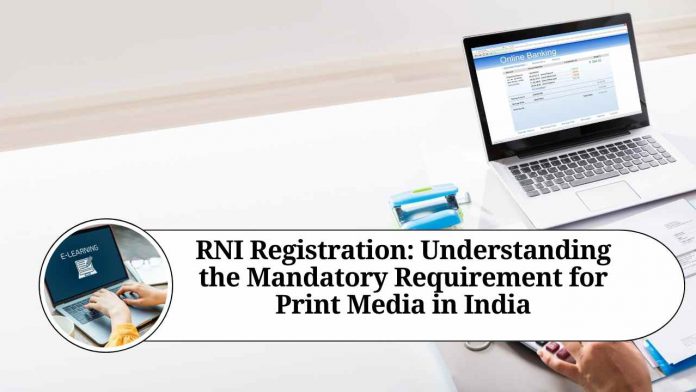Introduction
In the realm of print media in India, the Registrar of Newspapers for India (RNI) plays a crucial role in regulating and overseeing the newspaper industry. RNI registration is a mandatory requirement for publishers of newspapers, magazines, and other periodicals to operate legally in the country. This blog aims to shed light on what RNI registration entails and why it is significant for print media entities.
What is RNI?
The Registrar of Newspapers for India (RNI) is an autonomous body under the Ministry of Information and Broadcasting, Government of India. Established in 1956, its primary objective is to maintain a comprehensive database of newspapers and periodicals published in the country. RNI serves as a regulatory authority for print media, ensuring compliance with various legal provisions and guidelines.
What is RNI Registration?
RNI registration refers to the process by which publishers of newspapers, magazines, and other periodicals obtain recognition from the Registrar of Newspapers for India. It is a legal requirement for any entity seeking to publish a newspaper in India. The registration process involves submitting the necessary documents and information to RNI for verification and inclusion in the official database.
Importance of RNI Registration
- Legal Validity: RNI registration provides legal validity to newspapers and periodicals. Without this registration, publications cannot claim to be recognized or legitimate.
- Protection of Intellectual Property: RNI registration establishes ownership rights and protects the intellectual property of the publisher. It prevents unauthorized duplication or misuse of the publication’s name, title, or content.
- Accreditation for Government Advertising: RNI-registered newspapers are eligible to receive government advertising, which is a significant source of revenue for many publications. Government departments often prioritize advertisements in registered newspapers to ensure wider circulation and reach.
- Statistical Data: RNI maintains an extensive database of newspapers and periodicals published in India. This data serves as a valuable resource for researchers, advertisers, and policy-makers, providing insights into the print media landscape of the country.
Process of RNI Registration
The process of RNI registration involves the following steps:
- Application Submission: The publisher needs to submit an application in the prescribed format to the concerned RNI office. The application should include details such as the title of the publication, periodicity, language, place of publication, and ownership information.
- Document Verification: RNI scrutinizes the application and verifies the submitted documents, including copies of the publication, an affidavit from the publisher, and proof of ownership.
- Clearance and Approval: Upon successful verification, RNI grants clearance and approves the registration of the publication. The publisher receives a unique registration number, which should be printed on each issue of the newspaper or periodical.
- Periodic Declarations: Registered publishers must submit periodic declarations to RNI, updating information related to the publication, such as circulation figures, changes in ownership, or any other significant modifications.
Conclusion
RNI registration is a mandatory requirement for publishers of newspapers, magazines, and periodicals in India. It grants legal recognition, protects intellectual property, and opens doors to government advertising. By maintaining an extensive database of registered publications, RNI contributes to the transparency and growth of the print media industry. Aspiring publishers should familiarize themselves with the registration process and comply with the guidelines set forth by the Registrar of Newspapers for India to ensure a smooth and legitimate entry into the world of print media.
Read more useful content:
Frequently Asked Questions (FAQs)
Q: Who is required to obtain RNI registration?
A: Publishers of newspapers, magazines, and periodicals in India are required to obtain RNI registration.
Q: What are the benefits of RNI registration?
A: RNI registration provides legal validity, protects intellectual property, allows eligibility for government advertising, and contributes to the credibility and transparency of the publication.
Q: How can I apply for RNI registration?
A: To apply for RNI registration, you need to submit an application in the prescribed format along with the required documents to the relevant RNI office.
Q: What documents are needed for RNI registration?
A: The documents required for RNI registration include copies of the publication, an affidavit from the publisher, proof of ownership, and other relevant supporting documents as specified by RNI.
Q: How long does the RNI registration process take?
A: The duration of the registration process can vary, but it generally takes several weeks to a few months, depending on the completeness of the application and the verification process.
Q: Is RNI registration mandatory for online newspapers or digital publications?
A: No, RNI registration is specifically required for print publications such as newspapers, magazines, and periodicals. Online newspapers and digital publications fall under different regulatory frameworks.
Q: Can I change the title or language of my registered publication after obtaining RNI registration?
A: Yes, changes to the title or language of a registered publication can be made, but they need to be communicated to RNI through the prescribed process, including the submission of necessary documents and obtaining approval.
Q: Is there a fee associated with RNI registration?
A: Yes, there is a fee for RNI registration. The fee structure varies based on factors such as the periodicity and language of the publication. The current fee details can be obtained from the RNI office.
Q: Do I need to renew my RNI registration periodically?
A: No, RNI registration does not require periodic renewal. However, registered publishers are required to submit periodic declarations to RNI, providing updated information about the publication.
Q: What happens if I operate a newspaper without RNI registration?
A: Operating a newspaper without RNI registration is illegal. It can lead to penalties, fines, and legal consequences. RNI registration is necessary to ensure the legality and authenticity of a publication.




















